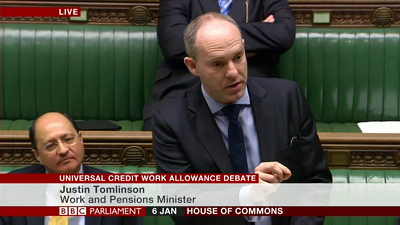
Let me take you back in time to 2010 – when we inherited a welfare system on the brink of collapse.
It wasn’t supporting people into work – in fact, quite often it did exactly the opposite.
The Labour government shamefully and complacently presided over a system that abandoned people to the sidelines of society – left them languishing on benefits with little or no incentives to work, let alone to progress in work.
The system had become so distorted, and so complex, that it all too often firmly shut the door on opportunity because it paid more to be on benefits than to be in work.
I say this with no disapproval of those who claim benefits – it was the system itself that was to blame and that is why we undertook to reform it.
Our aim was – and continues to be – to create a system that extends opportunity, and ensures work always pays. I am astonished that the Labour party continues to resist our reforms.
Front and centre of our reforms is Universal Credit.
This revolutionary new system is transforming lives and life chances across the country.
Labour retain a patronising view of benefit claimants – apparently seeing them as part of a client state to be protected – whose payments need to be perpetually increased.
We know that the vast majority of British people want to work.
They want the pride and esteem that comes with a job and a pay packet.
They have dreams, ambitions, boundless potential – and it is our job to ensure that they have the best possible chance of achieving them.
It’s worth remembering that under Labour, welfare spending went up by almost 60 per cent in real terms – costing every household an extra £3,000 a year by 2010.
And what was the result of all that spending? Was it money well-spent? In short, no.
The number of working people in poverty actually went up by about 20 per cent and we were left with nearly 1 in 5 households where no one worked.
The old approach of taking money from people’s wages and recycling it back to them in handouts wasn’t transforming lives, it was trapping them.
Why? Because it didn’t provide the right incentives or support for people to get on and realise their ambitions.
So the case for reform was clear.
Universal Credit was designed with the explicit aim of guaranteeing that people would always be better off in work.
This has always been at the heart of Universal Credit, and it continues to be so.
It provides the right incentives, alongside the support, for people to find work and then – crucially – progress in work.
Labour cast this as “forcing” people to work. But we know that most people want to work – no-one chooses to be dependent on the state.
We are supporting people to reach their full potential – to liberate themselves – to make the wholly positive move from dependence to independence.
Importantly and uniquely, UC stays with people when they enter work until their earnings reach a certain level or until they can support themselves.
And I think that this is where Universal Credit comes into its own: claimants have a single point of contact with a work coach who provides personalised support, advice and guidance to help them develop and progress in work.
In other words, UC not only supports people to move into a job, it also helps people to build a career.
Our pledge to get Britain working – to give people the skills and the opportunities to reach their full potential – is being realised.

